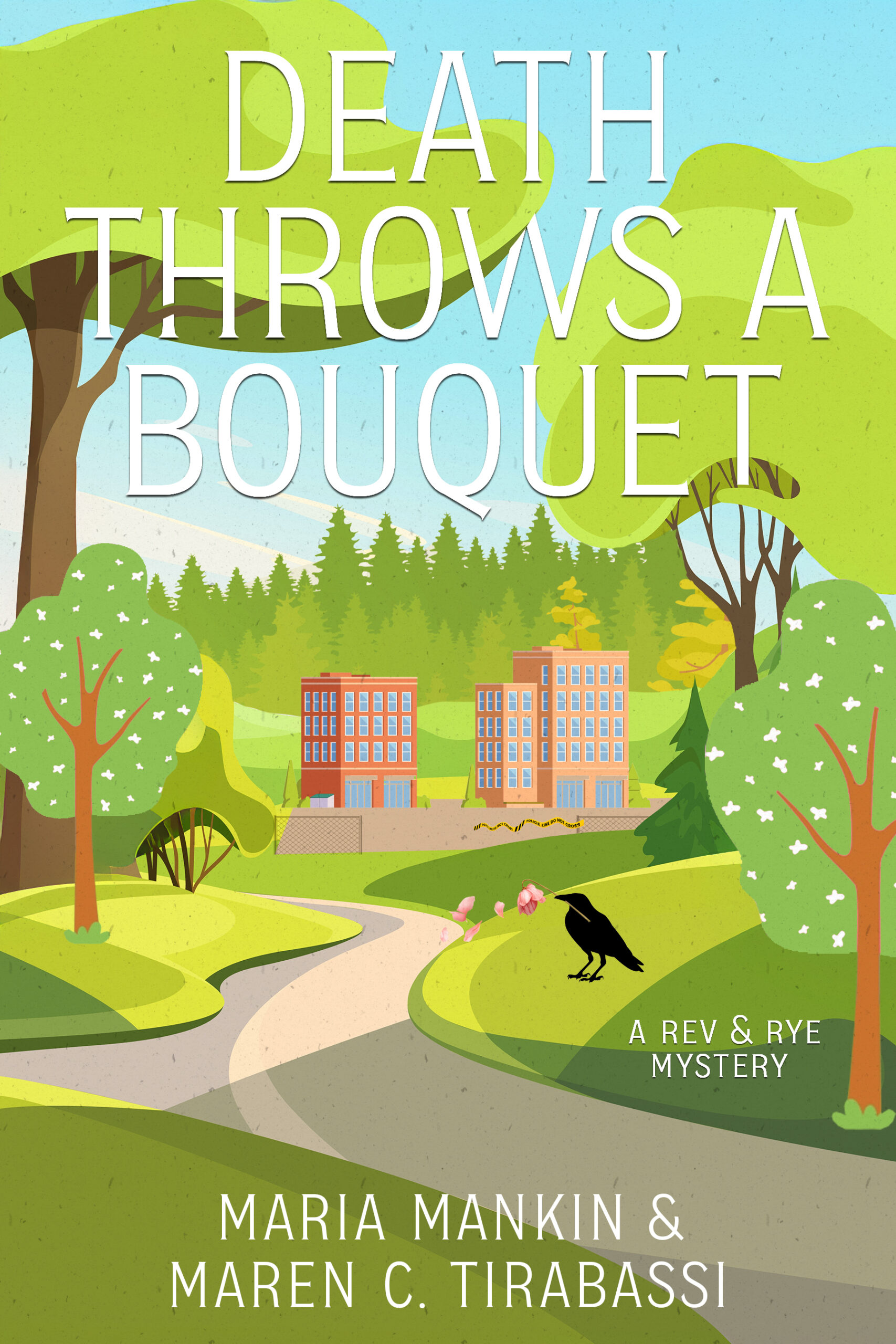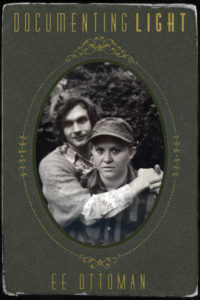Death Throws a Bouquet
Maria Mankin & Maren C. Tirabassi
The Rev and Rye Series • Release Date: December 2, 2025
Print ISBN: 978-1-948559-95-9 • Ebook ISBN: 978-1-948559-94-2
This engaging and clever installment in the Rev and Rye mystery series tosses a possible murder into the middle of wedding season…
Everyone believes their wedding day is special, but a reverend’s June calendar is filled with more than a few “special” days. The Rev. Wanda Duff has to juggle her officiant duties alongside caring for her beloved teenage nephew, the impending arrival of her sister with her Scottish fiancé for their wedding (which Wanda soon realizes she is expected to plan), and a new houseguest in the form of her future brother-in-law’s son, who’s happy to show her nephew a little more summer adventure than Wanda’s strictly comfortable with. Oh, and there’s her favorite retired sheriff, who wants her to look into the accidental slip-and-fall death of a high school teacher well-known for ruffling feathers. Because what Wanda needed was to fit in a good sleuthing between rehearsal dinners and family drama?
High school vice principal Prudence Rye also has plenty of good reasons to pass on another small-town mystery, not the least of which is her own family drama in the form of her resurfaced long-lost sister, a student in crisis, and an enormous helping of unrequited feelings for (oh no) both of her best friends. But when the investigation involves students at her high school who live at the apartments where the teacher died, Rye is compelled to partner with the Rev to get to the bottom of an accident that doesn’t seem so accidental.
It turns out that a murder investigation is a lot like planning a wedding. It requires discretion, the ability to pivot, and an instinct for trouble. The Rev and Rye have all three, plus friends and new family willing to help. Will it be enough to catch a killer and pull off the wedding of the season?
Compelling and full of wry humor, the Rev and Rye novels are quickly establishing their place among the best of cozy mysteries.
Praise for the Rev & Rye Mysteries
Rev and Rye are strong, sympathetic ‘Marples-in-training’ who never disappoint.
—Amy Patricia Meade, author of the Tish Tarragon Mysteries
The newest Rev and Rye mystery delivers the goods and goes beyond the brief to shine a needed light on the power of friendship and the persistence of love, in all its forms.
—Darrow Woods, author of the Rev. Thomas Book Mysteries
Rich in detail and populated with a myriad of fascinating and flawed characters, this latest Rev and Rye mystery will keep you guessing as you read—and keep you thinking long after you've closed the book on the final page.
—Penelope J. Stokes, author of Circle of Grace and Heartbreak Cafe
Mankin and Tirabassi masterfully blend small-town charm with pulse-pounding suspense, creating a mystery that will keep you guessing until the final page.
—Jane Willan, author of the Sister Agatha and Father Selwyn mystery series
Here’s small town life portrayed with humor and affection, peopled with quirky characters you’ll care about.
—James Patrick Kelly, winner of the Hugo, Nebula and Locus awards
ABOUT THE AUTHORS
Maren C. Tirabassi’s forty-five years’ experience in mainline ministry shape Wanda Duff’s professional life (but not her personality). In addition to the three previous Rev and Rye mysteries, Maren has published twenty-two nonfiction titles, one book of short stories, and two books of poetry, as well as poetry and short stories in fifteen anthologies. She is a former Poet Laureate of the city of Portsmouth, New Hampshire, and the recipient of the 2023 Lifetime Achievement Award from the New Hampshire Humanities Council.
After teaching and working in early education for a decade, Maria Mankin has published six books with Pilgrim Press, in addition to first three Rev and Rye mysteries with Brain Mill Press, and she has contributed essays to several anthologies. She is also a coauthor of Circ, a mystery set in Skegness, England, published by Pigeon Park Press, and Pitching Our Tents: Poetry of Hospitality. She is a regular contributor to Living Psalms, a collection in which the Psalms are reinterpreted in poetry and art as a reflection of God’s work of justice and compassion. In 2024, Maria received an Impact on Education Award for her work with elementary grade students and staff.
AN EXCERPT from Death Throws a Bouquet by Maria Mankin & Maren C. Tirabassi
Chapter 1
Jodi Franklin graded papers for two hours before she took a break to get a cup of tea. She had been teaching for thirty years, and two hours was nowhere near her record. In her younger days, she could mark up essays all day on a Saturday, then drive through the night to visit her younger brother and listen to him sing a solo at church on Sunday morning.
These days her priorities were in better order. Not that she wouldn’t still drive to see Daniel when he was performing, but she would never spend her whole weekend working. If a student only spent an hour writing a six-page research paper on the Kennedy assassination, and most of that time was given to coordinating questionable AI input, Jodi was only going to spend five minutes grading it.
At this point, a lot of her job seemed to involve entering paragraphs into plagiarism databases while deciding whether she could make it through one more year of this nonsense before retirement. To be fair, she mostly felt that way in early June, but the burnout had gotten worse. She loved her summers off too much to quit, even when the last of her friends from the old guard had moved to Florida. The fights with administration over teaching to the AP test versus encouraging critical thinking skills, the constant emails from parents complaining about her lowering their children’s GPAs with her “overly rigorous” expectations, and those same students failing to follow even the most basic instructions on a daily basis all ground her down.
Teaching had been Jodi’s passion ever since she’d first picked up Anne of Green Gables as a child. She had managed to keep that flame lit through countless shifts in the educational landscape. Now, though, she was done. In early September, she had negotiated time off to go to the Grand Canyon, and next June she would be on her way to Patagonia to begin her trip around the world. She would never pick up a red pen again.
Jodi glanced out her office window and noticed several of the neighbor boys arguing over their pickup game of basketball. A few went to the local high school, Stoneridge, where she had taught as a young woman before transferring to neighboring Lincoln High in an effort to separate her personal life from her professional one. She recognized all the kids who lived at the Cedars Apartments. Wyatt Eames was often out there, since his parents owned a food truck and were gone for long stretches, and his friend with the expensive haircut was with him tonight. Noah something? It would come to her, probably at two in the morning.
They were up against some newcomers—older than high school, by the looks of them—and those men did not sound happy. Jodi knew, by sight at least, most of the people who lived here, even with families moving in and out all the time. She had called this place home for two decades, but many people saw the Cedars as a stopping point, and not always a happy one. She was used to hearing arguments through the thin walls and passing by all manner of petty illegal behaviors in the stairwell or the parking lot outside. Jodi had called the police more times than she could remember when she suspected the fights were ongoing abuse. That hadn’t endeared her to the abusers, the victims, or to the children who saw family members driven away in the back of squad cars, but at least she could sleep at night.
Perhaps being a history teacher made her fond of documentation. She wrote daily about the goings on around her building, thick journals she could produce when law enforcement questioned her about an incident she had reported. Often her decision to track incidents of violence against women with dates and a record of observable injuries made the difference in court. Her corner fourth–floor apartment had the best view in the building. She was ‘that person’ at Cedars, and she owned it.
She glanced back out at the court, but the basketball players had wandered over to the Eames family’s food truck, which must have pulled up while she was in the kitchen fussing with her old kettle. Wyatt and his friend had disappeared, too, probably to the parking lot, which she couldn’t see from her window. She could hear shouting, though, and what sounded like someone crying. Her down-the–hall neighbor Jewel had a three-month-old, but Jodi knew little Missy’s cries. This sounded like a woman.
Jodi put down her mug and tried to raise the window higher so she could stick her head out. No luck. This rain, along with the blasted heat and humidity, had the old wood swollen tight. She sighed, grabbed her raincoat from the hook by the door, and slid her feet into a pair of old flip–flops. A teacher’s work was never done.
Chapter 2
Dystopian fiction would have readers believe that teenagers were the best choice to save the world, but in reality they were just the easiest demographic to convince to do stupid, dangerous things, which was why Prudence Rye needed to find some.
As vice principal of Stoneridge High School, Rye had a certain clout with kids who were often in her office, while her friend and pastor Wanda Duff, a woman twenty years her senior (with the patience and wisdom to show for it, as well as the occasional gray in her hair) could call in the assistance of youth group members, as well as her live-in nephew, Lance, and his best friends.
Wanda and Rye had become friends a year ago, when Wanda began investigating the suspicious death of a parishioner, Niels Pond. Wanda and Rye had achieved local amateur sleuth fame by solving several other cases together since then, in addition to becoming close friends. Wanda and Lance often joined Rye and her father, Hardy, for dinner, although recently Wanda and Hardy would slip away after the meal and leave Rye with Lance and his friends for entertainment. Rye didn’t mind. It was nice to see both her friend and her father looking so happy, and as an only child she enjoyed the chance to boss around a few younger “siblings” now and then.
Today, though, it wasn’t the world that needed saving, but a wedding. Was the flooding of the library parking lot the end of the world? Rye would have said no, but the grooms disagreed. Their wedding was in an hour, and Rye and Wanda had been fielding calls from guests all morning—ever since Tony dumped the problem in their laps and told them to fix “this.”
Tony Tomeo was Wanda’s longtime best friend, Trinity UCC’s choir director, and the all-around music guru at the high school. Tony had been an absolute shark in the dating pool until he met Greg Engstrom. Greg, a librarian with sweet cherub cheeks and surprisingly acerbic wit, had won Tony over completely.
“This” was one of several storms of the century that Stone Ridge had experienced this year. It seemed like every other week there were warnings about power outages, downed trees, and, yes, flooding. This storm, which had been predicted to pass north of them, had shown up with all that and more—a tornado warning that had sent the grooms spinning.
“Are you having any luck?” Wanda asked Rye as she hung up from another unsuccessful phone call with the public works department. Wanda pushed her hair off her face. She’d obviously tried to curl it this morning, but it lay sticky on her neck now.
“None.” Rye had called her father, the former sheriff, to see what connections he might have to get the sewer grates cleared on the street. The parking lot was a lost cause until Monday, but street parking was available if they could move some of the trapped water. “Dad says everyone he knows is tied up with river overflow and neighborhood flooding or is too old and feeble to risk the weather.”
“I don’t know what we’re going to do.” Wanda looked frazzled.
“We’ll figure something out,” Rye told her with a confidence that was starting to wane. She had a lot of practice telling people half truths as part of her job, but she hated to lie to Wanda. The truth was, if Lance and his friends didn’t come through, the wedding might be ruined. “Why don’t you go sit with Tony for a few minutes? I’ll be on phone duty, and you can work your ‘this will all work out’ woo-woo magic on him.”
“Are you talking about pastoral counseling?” Wanda asked with a small smile. “You know I’m not a fortune teller at a carnival, right?”
“Same, same,” Rye said, suddenly much brighter, shooing her toward the library’s reference room, where Tony and Greg were getting ready.
A text from Lance had finally come in. Here, it read, with a cluster of emojis she didn’t have time to parse. Rye grabbed her coat, a shiny silver number Wanda had convinced her to buy that had turned out to be cuter and more waterproof than expected, and slipped out of her strappy sandals and into rain boots. She dashed outside, pulling her hood up against the wind. Down the street, a Yukon XL rounded the corner. It was followed by a parade of SUVs driven by Stoneridge students and at least one teacher. Mike Nifterick taught PE but was more popular in his role as coach of the track and field teams. Rye hadn’t realized he even owned a car, much less an SUV. She had only seen him ride a motorcycle to school before, but here he was, first in line, hopping down to open the back door.
Mike offered a hand to his elderly passenger, then went around the other side to help another woman over the rushing gutter. Under his raincoat, he was dressed for the wedding. Rye realized that though she only thought of him as an occasional running buddy, Mike and Tony must be friends from school. She never would have guessed it.
When Lance had asked Rye why she needed him to find out who drove the passel of high-end, flood-ready vehicles Rye passed every day in the school parking lot, she had sent him a link to the best cars for handling these exact conditions. Why else would the parents of these children have purchased them Suburbans, Wranglers, Land Rovers, and even a Hummer? If ever there was a day to put teenagers to use, this was it, and if their parents had a problem with it, they probably should have bought them secondhand Kia Fortes or Camrys instead.
Of course that wasn’t what Rye told Lance. Instead she had tasked him to get those cars out to the hotel where Greg and Tony held a block of rooms, with the promise of as much free pizza as the drivers could consume if they could shuttle the guests to the library. Greg had been skeptical that it would work, but Rye, Wanda, and Tony had enough experience with teenagers to know they required little motivation to take risks like driving in foul weather. Sure enough, plenty had responded, and Rye was glad she’d filled the library’s staff room with not only pizzas from A Slice of Pi next door but also packages of cookies and plenty of water and lemonade. Rental cars might not make it through this storm, but the guests would.
She waved to her students as they stopped at the curb. Luckily, Hardy had dropped off the umbrellas Wanda had been collecting earlier in the week, so most of the guests arriving had protection from the downpour. Rye was doing her paparazzi best to get some pictures and videos of this moment (funnier in hindsight, she hoped) for Tony and Greg, but if she stayed out much longer, she was going to be soaked to the bone. Fortunately the last few cars were pulling up, and she spotted Lance with his best friends, Leslie and Nicole, hopping out of the last one. She waved to them, and they all ran up the path together.
The lobby of the library was a joyful tumult when they stepped inside, scented by the lilac branches scattered in vases on almost every surface, as well as a whiff of wet dog. Rye hung up her sopping jacket and turned to see the grooms and Wanda coming down the hall with Wanda’s terrier, Wink, wearing a collar with tiny fabric flowers. Wanda may have nixed Wink’s participation in the ceremony itself, but that didn’t mean he couldn’t be dolled up for the occasion.
When the two men were led in, having been sequestered in dramatic despair, a cheer went up from the assembled, dripping crowd of family and friends. Tony burst into tears as Greg wrapped him in a hug. Rye was glad she still had her phone out to catch the moment.
Wanda, in full ministerial mode, stepped to the front and held up a hand for a silence, which she miraculously achieved. “Ten minutes to dry off and chat while we wait for a few more people, but when I ring this bell”—Wanda held up a small replica of a Paul Revere bell—“you’ll take your seats, and the ceremony will begin. There will be plenty of time at the reception to catch up!”
“And eat!” someone in the back of the crowd called. Tony whooped in agreement, and the guests let out another cheer.
Chapter 3
Wanda was counting Marples.
When a clergywoman is waiting for that single wedding photo she’s in (which, of course, will be the last one), and she is in a library with a fantastic DVD collection for Luddite patrons, she has time to compile a mental list of every actress who has played Jane Marple. She began with Margaret Rutherford, of course, and then there was the young Gracie Fields—poor dear, she tried—and on to Helen Hayes and Angela Lansbury, June Whitfield on the radio, Kaoru Yachigusa in anime voice–over, Joan Hickson, Geraldine McEwan, who was quite stern, and finally a few others far too young, which was how Wanda Duff usually thought of herself.
After she and Rye had solved four murders in barely a year in the small town of Stone Ridge, she might well be a Marple-in-training, but she didn’t want life to mimic fiction. She fervently hoped that Luisa Suarez was the last murder victim who would require Wanda’s self-taught detective skills. She should be counting weddings instead, because she was officiating four more of those in the next month, something unheard of in this era of wedding planner officiants.
Wanda had made it through Tony and Greg’s ceremony with minimal tears—more than strictly professional, but fewer than expected when a best friend was at the altar—but now she had been released to stand alone by the cheese spread, trying to look busy without actually eating herself into a brie-induced haze. Her head was starting to hurt, an unfortunate side effect of using her hearing aids at events like this, where there was music and background chatter constantly blurring what she wanted to hear. In the past, she had dulled the problem with a drink or three, but she had been sober now for almost seven months. A couple of Tylenol would have to get her through to bedtime instead.
If she’d brought a plus–one, she might not have noticed the pain. Wanda had waited patiently, like a girl before prom in another era—well, her era—for Hardy Rye to issue an invitation. But no invitation came.
She would have happily settled for the company of a friend, and as it happened many of her friends were here. They were just busy with their own partners at the moment, or, in Rye’s case, engaged in a not-so-subtle spy mission regarding her father’s plus-one. To be fair, Wanda was in favor of this particular detective work. In fact, if Rye didn’t learn something about Hardy’s mystery date, Wanda was ready to go full Marple on that situation herself.
It wasn’t that she and Hardy were officially anything. Friends. They were officially friends, and he had almost kissed her six times (not that she was counting). They ate dinner together a few times a week, and if those meals were overrun by teenagers, dogs, adult daughters, and the gaggle of people who came with them, all the better! She and Hardy loved a full house. It was another thing they had in common.
He didn’t even mind that she was an amateur sleuth. As a retired sheriff, Hardy encouraged it, talking through self-defense techniques and investigations he had been a part of to give her a better understanding of the intersection between police procedure and gut instinct. It energized both of them to have cases to consider, and as tragic as the murders were, they had brought Wanda into a family she couldn’t have imagined this time last year.
Maybe she wasn’t the romantic lead, though. Maybe she was the best friend instead, she thought, as she watched Hardy and the mystery woman linger over their meals, deep in conversation. After all, she had a nephew she adored, a group of dear friends, and two dogs. Wink, the graying Jack Russell, had fallen asleep at the altar, and Figgy, short for Figaro, a foxeagle with a foxhound’s tall legs and a beagle’s howl, who had been fostered over the winter and never left. Her life was rich beyond measure. Her house was a mess.
But still there was a twinge of jealousy. This woman was fortysomething instead of fiftysomething, like Wanda. Hardy was in his early sixties and good–looking, with unbelievable cooking skills, a quick but gentle wit, and a presence she felt easy in. Wanda had gone on enough dates after her second divorce to know that those were not characteristics typically found in men her age. She’d usually settled for a sense of humor and something less than complete revulsion at her profession.
Wanda might have spiraled, but as she gazed out at the people gathered for her friends’ wedding, she suddenly realized it was chock full of charming gay men willing to dance with a short, aging clergywoman. Tony, known to most as the high school music director, was also the instrumentalist and choir director at Trinity. Between his two jobs, he seemed to know everyone in town, and every gay man in the area had shown up, many of whom Tony had introduced to her as ex-boyfriends. Wanda loved Tony with all her heart, but she knew that he had been a loose cannon on the local dating scene. Although surprised he fell hard for a librarian, she also breathed a sigh of relief.
When she got to know Greg Engstrom better, she was ecstatic. If Tony was the closest thing to a brother Wanda had, welcoming Greg into the family was a dream come true. He was much more reserved than his new husband, but also devastatingly witty, unfailingly kind, and, as Tony put it, gifted in the handsome department. Wanda thought of Greg as adorable more than anything else, with those bright eyes and white-blond curls that had grown out just long enough to be pulled back with tiny flower clips that matched his boutonniere.
During the ceremony, Wanda had caught Greg with a bewildered expression on his face, a look she recognized from many folks who had been abused in past relationships and still weren’t certain they deserved to be happy. She decided to quote Frozen 2, impromptu to her wedding homily, instructing the couple to just “do the next right thing.” Greg’s face had cleared, and his radiant smile returned.
The wedding and reception choice of Greg’s home away from home, the social hall of the library where he was the director of acquisitions, had been an “ark” thanks to those rides Rye and Lance had found. Much to eat and no alcohol—a library rule—so it didn’t stand out that Greg and Wanda both were in recovery. Greg had also procured the space for free, leaving the budget for delicious food and fabulous live music. Wanda stuffed herself, then discovered she still had room to try small slices of all three wedding cakes. (Tony had claimed they couldn’t decide, but Wanda knew that he just adored sweets.)
Before she had a chance to find a partner, Greg’s parents found her to express their joy at the wedding.
“We noticed that you used the Lutheran service language for the ring exchange. That meant a lot,” Greg’s mother told her.
Her husband nodded in enthusiastic agreement. He was looking around, apparently hoping to corner someone who might have baseball scores, but he turned back to interrupt his wife’s detailed recounting of the service with a question. “We drove past the high school and noticed that the sign said, ‘Stoneridge High School,’ one word. Aren’t we in Stone Ridge, two words?”
That was an expected question from out-of-towners. Wanda smiled. “The town is Stone Ridge. A benefactor paid for that granite monstrosity, but he scribbled the information incorrectly. The stone mason refused to change it for free, and before the issue was resolved, the mason died. His family inherited the problem but were unwilling to change it, and the town was certainly not going to pay for it. And so Stoneridge is the school, one word. Thrifty and stubborn is not exactly the definition of New England, but it comes close.”
He nodded thoughtfully as his wife drew him away to another guest. Wanda took the opportunity to cross the room to see Rye. Her friend looked like she had been crying, though her face was scrubbed clean.
“Hey,” Wanda said, taking Rye by the elbow and steering her into a space between the coat racks and the wall where they couldn’t be seen by guests trooping back and forth to the restrooms. “What’s wrong?”
“Have you talked to my dad tonight?”
“No,” Wanda replied, dryly. “He’s been … occupied.”
“Yes,” Rye said. “With Kara.”
Wanda faced few opportunities when gasping was the appropriate reaction, but this was one of them. In February, when Rye and Wanda had been studying a cold case, Rye had discovered she had an older half sister, Kara, as well as a step-uncle, Reuben. Rye’s mother, Melanie, had never shared with Hardy the existence of these people.
In the last few months, Rye and Reuben had met a few times for coffee. Reuben had told her that Kara was raised by Melanie’s aunt Nora in Colorado, but he didn’t know what had become of Melanie after she disappeared when Rye was seven. Rye had been grateful that her uncle was genuine in his desire to get to know her, but Kara hadn’t responded to emails Rye sent. Wanda knew that had hurt Rye deeply, although she tried to hide it.
And now here Kara was, Hardy’s plus–one for the evening, with no warning. He apparently hadn’t even bothered to introduce Kara to Rye; instead, she’d learned the woman’s identity from Greg, who had heard from Tony, who was enthusiastically making the rounds. Tony was protective of Wanda and undoubtedly had set out to interrogate Hardy’s date.
“What do you mean he brought Kara?” Wanda asked. Right behind “gasped” was “gobsmacked,” a feeling she was sure she had never properly experienced until right now. “Why would he do that?”
“I have no idea, but you can bet I’m going to find out!” Any sign of tears had been replaced by fire Wanda recognized. Rye was marching into battle.
Wanda grabbed her by the arm and pulled her back. “Not right now you’re not!”
“Why not? Aren’t you curious?”
“I’m dying to know when he completely lost his marbles, but Greg and Tony are making a toast, and I will not tolerate any distractions. Got it?”
Rye glanced at the happy couple, then nodded. “I’m going to head home then. I can’t be in the same room with my father right now and guarantee it won’t end in bloodshed.”
Wanda understood the sentiment. Only through pastoral restraint would she keep this summer from turning into five weddings and Hardy’s funeral.



 EE Ottoman grew up surrounded by the farmlands and forests of Upstate New York. They started writing as soon as they learned how and have yet to stop. Ottoman attended Earlham College and graduated with a degree in history before going on to receive a graduate degree in history as well. These days they divide their time between history, writing, and book preservation.
EE Ottoman grew up surrounded by the farmlands and forests of Upstate New York. They started writing as soon as they learned how and have yet to stop. Ottoman attended Earlham College and graduated with a degree in history before going on to receive a graduate degree in history as well. These days they divide their time between history, writing, and book preservation.
